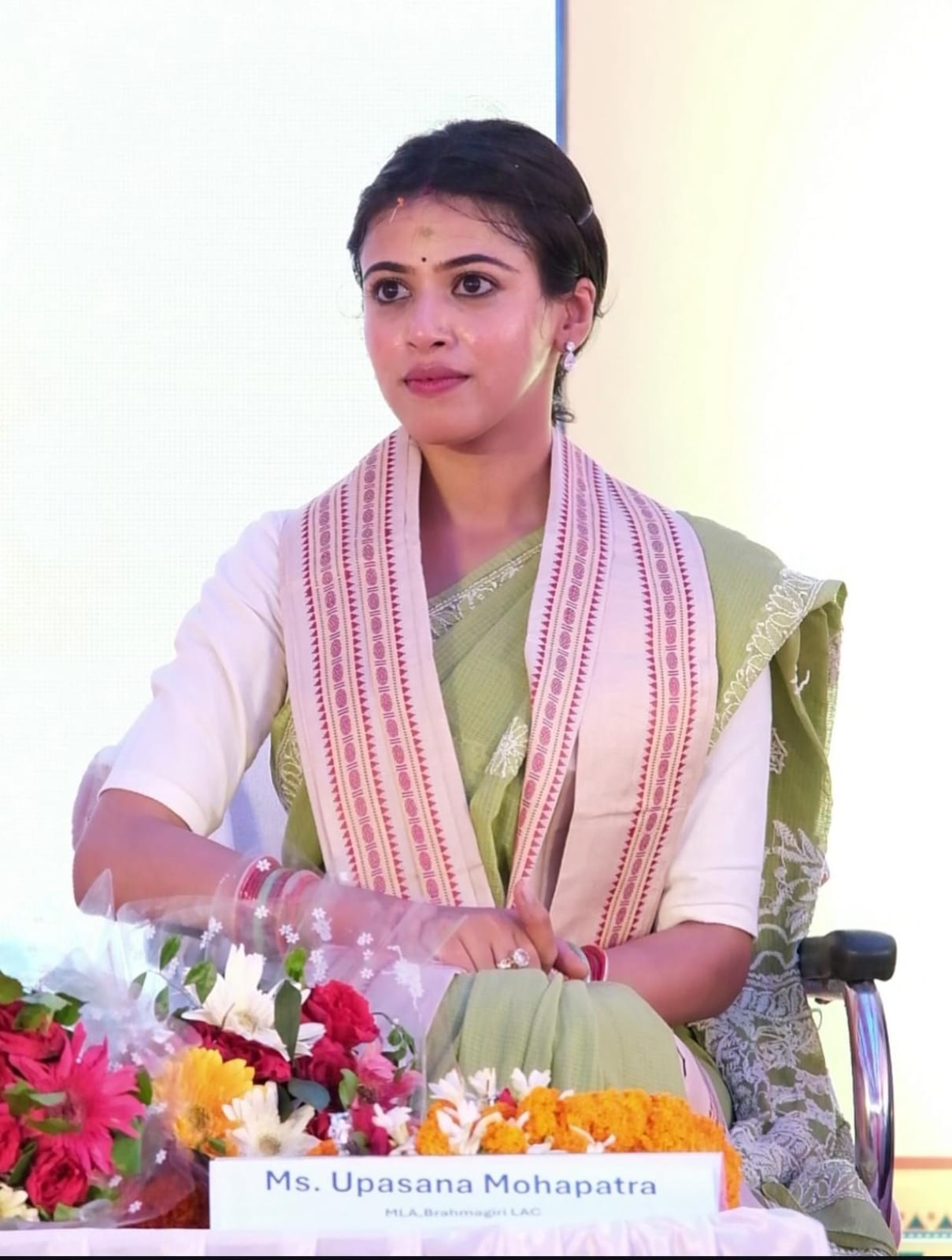WRITTEN BY : PRIYANSHU MOHANTY
In the ever-shifting landscape of Odisha’s politics, a few figures stand out not just for their electoral presence but for the ability to craft a narrative of leadership that resonates with people at multiple levels. Among them, Honourable MLA Upasna Mohapatra represents a fresh chapter in the story of Odisha’s younger political leadership. Coming from a legacy that has already contributed much to the state’s political culture, she has not merely walked the familiar paths laid before her but has worked to carve her own space in a competitive and challenging environment. Her journey reflects the confluence of youthful energy, deep-rooted family influence, and a conscious effort to adapt to the changing modes of political communication that define the modern era.
Her entry into active politics was seen as both an inheritance and a responsibility. Carrying forward the legacy of her grandfather and her father, she was expected to continue the family’s political relevance in the constituency. But what has distinguished her approach from a purely dynastic continuation is her conscious decision to focus on building a people-oriented image rooted in accessibility, empathy, and an understanding of the aspirations of the constituency. Political legacies may open doors, but it is consistent engagement and credibility that sustain them, and she has sought to ensure that her connect with the grassroots remains genuine.

Her presence in Brahmagiri politics has coincided with a time when the expectations of voters are shifting rapidly. The constituency, while rich in cultural heritage and agriculture, continues to face the challenges of migration, livelihood uncertainties, and youth unemployment. Instead of relying solely on traditional campaign methods, she has embraced multiple channels of outreach. Social media has been an important tool in this regard, allowing her to frame her initiatives, communicate development updates, and create a direct link with the younger population of her constituency who increasingly look for representation that speaks in their language. Yet, she balances this with on-ground interactions – village meetings, door-to-door visits, and participation in local cultural and social events – that reinforce the sense that she is not a distant figure but someone who belongs to the same social fabric.
One of her notable strengths is her ability to frame communication in a way that emphasizes collective progress. Her political speeches, whether at the constituency level or during larger party events, often blend themes of continuity and change. Continuity lies in respecting the traditions and contributions of those who came before her, while change lies in her willingness to address contemporary challenges like digital connectivity, skill development, and the inclusion of women and youth in decision-making spaces. This duality allows her to appear rooted yet forward-looking, a quality that resonates in a constituency like Brahmagiri where people value both tradition and opportunity.

Development remains a central theme in her political narrative. For Brahmagiri, situated within Puri district, aspirations are tied not only to basic infrastructure but also to sustainable livelihood opportunities. The fishing community, for instance, looks for government interventions that can enhance their income security and market access. Similarly, agricultural families expect policies that can reduce dependency on uncertain climatic conditions and ensure better returns for their produce. She has consistently emphasized that addressing these needs requires both government support and local participation. Her dialogues with state authorities reflect her effort to channel resources and schemes into her constituency, while her grassroots meetings underline the need for collective responsibility in ensuring their proper implementation.

Her focus on education and youth empowerment has also been evident in the way she engages with young people in her constituency. She has spoken about the importance of skill training, exposure, and opportunities that can reduce the migration of educated youth to urban centers. At the same time, she positions herself as approachable, often encouraging direct interactions that allow students and young professionals to voice their concerns. This image of accessibility is central to her communication strategy. In an era where many voters feel alienated from their representatives, she projects herself as someone who listens before speaking, a quality that not only strengthens trust but also makes her leadership style more participatory.
What makes her journey particularly interesting is the way she navigates the dual expectations of being part of a political family and being her own leader. There is a natural weight of legacy in Brahmagiri, where voters have long associated her family name with representation. But she has been careful not to reduce her political identity to a continuation of lineage alone. By actively participating in local development initiatives, speaking on larger policy issues, and showcasing her independent voice on various platforms, she projects herself as a leader who carries forward tradition while also establishing her individuality. This balance helps her appeal to older generations who value loyalty to legacy and younger voters who look for dynamism and modernity in leadership.

The communication environment in which she operates today is vastly different from that of her predecessors. Politics is no longer just about public rallies and physical meetings; it is about shaping perceptions in real time, managing narratives on digital platforms, and responding quickly to public issues. She has been able to adapt to this with considerable skill, using social media not just as a publicity tool but as a medium of dialogue. Whether it is sharing updates about constituency projects, celebrating cultural milestones, or addressing misinformation, she maintains a digital presence that complements her on-ground efforts. This two-way engagement makes her relatable and strengthens her political branding as a modern-day leader who is responsive and in tune with her constituency’s pulse.
Looking ahead, the challenges before her are significant. Brahmagiri, like many constituencies in Odisha, demands not only developmental interventions but also consistent advocacy at the state level. Issues like coastal erosion, disaster preparedness, health infrastructure, and rural livelihood diversification require both policy advocacy and efficient local implementation. She will be judged not just by the promises she makes but by the tangible outcomes she can deliver over time. Yet, her emphasis on communication, her willingness to adapt to the changing demands of politics, and her conscious efforts to merge legacy with individuality position her strongly to meet these expectations.

Her political journey is still in its formative years, and this offers her both opportunities and challenges. On one hand, she represents the new generation of leadership that Odisha is beginning to witness s- leaders who are young, articulate, and digitally savvy. On the other hand, she prove that her leadership is not confined to the privileges of family legacy but is anchored in hard work, vision, and consistent engagement with the people. In this journey, every interaction, every communication strategy, and every policy initiative will shape her long-term identity.
For Odisha, leaders like her symbolize a generational shift where politics is increasingly about blending tradition with innovation. For Brahmagiri, she represents continuity of trust with a promise of transformation. And for young people across the state, she embodies the idea that leadership today is not just inherited but earned through the ability to communicate, connect, and create meaningful impact. In the years to come, as Odisha navigates its path of development, leaders like Honourable MLA Upasna Mohapatra will play a critical role in ensuring that politics remains not just about governance from above but about conversation, collaboration, and progress built together with the people.










